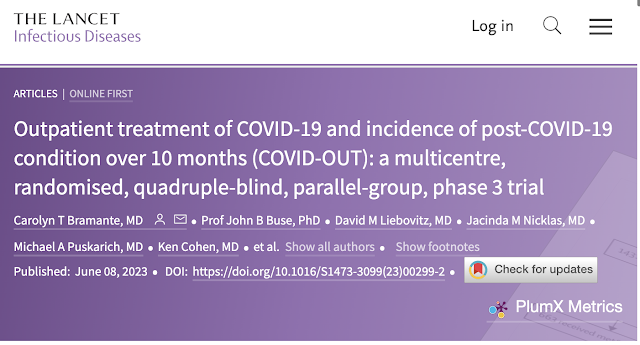Outpatient treatment of COVID-19 and incidence of post-COVID-19 condition over 10 months (COVID-OUT): A multicentre, RCT, phase 3 trial
Background
Post-COVID-19 condition (also known as long COVID) is an emerging chronic illness potentially affecting millions of people. We aimed to evaluate whether outpatient COVID-19 treatment with metformin, ivermectin, or fluvoxamine soon after SARS-CoV-2 infection could reduce the risk of long COVID.Methods
We conducted a decentralised, randomised, quadruple-blind, parallel-group, phase 3 trial (COVID-OUT) at six sites in the USA. We included adults aged 30–85 years with overweight or obesity who had COVID-19 symptoms for fewer than 7 days and a documented SARS-CoV-2 positive PCR or antigen test within 3 days before enrolment. Participants were randomly assigned via 2 × 3 parallel factorial randomisation (1:1:1:1:1:1) to receive metformin plus ivermectin, metformin plus fluvoxamine, metformin plus placebo, ivermectin plus placebo, fluvoxamine plus placebo, or placebo plus placebo. Participants, investigators, care providers, and outcomes assessors were masked to study group assignment. The primary outcome was severe COVID-19 by day 14, and those data have been published previously. Because the trial was delivered remotely nationwide, the a priori primary sample was a modified intention-to-treat sample, meaning that participants who did not receive any dose of study treatment were excluded. Long COVID diagnosis by a medical provider was a prespecified, long-term secondary outcome. This trial is complete and is registered with ClinicalTrials.gov, NCT04510194.
Findings
Between Dec 30, 2020, and Jan 28, 2022, 6602 people were assessed for eligibility and 1431 were enrolled and randomly assigned. Of 1323 participants who received a dose of study treatment and were included in the modified intention-to-treat population, 1126 consented for long-term follow-up and completed at least one survey after the assessment for long COVID at day 180 (564 received metformin and 562 received matched placebo; a subset of participants in the metformin vs placebo trial were also randomly assigned to receive ivermectin or fluvoxamine). 1074 (95%) of 1126 participants completed at least 9 months of follow-up. 632 (56·1%) of 1126 participants were female and 494 (43·9%) were male; 44 (7·0%) of 632 women were pregnant. The median age was 45 years (IQR 37–54) and median BMI was 29·8 kg/m2 (IQR 27·0–34·2). Overall, 93 (8·3%) of 1126 participants reported receipt of a long COVID diagnosis by day 300. The cumulative incidence of long COVID by day 300 was 6·3% (95% CI 4·2–8·2) in participants who received metformin and 10·4% (7·8–12·9) in those who received identical metformin placebo (hazard ratio [HR] 0·59, 95% CI 0·39–0·89; p=0·012). The metformin beneficial effect was consistent across prespecified subgroups. When metformin was started within 3 days of symptom onset, the HR was 0·37 (95% CI 0·15–0·95). There was no effect on cumulative incidence of long COVID with ivermectin (HR 0·99, 95% CI 0·59–1·64) or fluvoxamine (1·36, 0·78–2·34) compared with placebo.
Interpretation
Outpatient treatment with metformin reduced long COVID incidence by about 41%, with an absolute reduction of 4·1%, compared with placebo. Metformin has clinical benefits when used as outpatient treatment for COVID-19 and is globally available, low-cost, and safe.
Research in context
Evidence before this study
Few randomised trials of outpatient treatment of COVID-19 have followed participants for 10 months to assess the effect of early treatments on the incidence of post-COVID-19 condition (also known as long COVID). Emerging clinical, observational, and preclinical data have shown that metformin inhibits SARS-CoV-2 and prevents severe COVID-19. We searched PubMed on July 1 and Aug 5, 2020, with no date or language restrictions, using the terms “metformin” and “COVID-19” and “clinical trial”; and “metformin” and “SARS-CoV-2” and “clinical trial”; similar searches were done using “ivermectin” and “fluvoxamine” on Jan 25, 2021. These searches did not identify any randomised trials of early treatment of SARS-CoV-2 infection with metformin, nor any phase 3 randomised trials with fluvoxamine or ivermectin. On March 1, 2023, we searched PubMed with the terms “clinical trial” and “COVID-19” and “SARS-CoV-2” and “randomized” and each medication individually. For ivermectin, placebo-controlled trials showed no clinical effect with 3 days of treatment (the TOGETHER trial in Brazil [400 μg/kg per day], the ACTIV-6 trial [300 μg/kg per day], de la Rocha and colleagues, and Rezai and colleagues [400 μg/kg per day]) nor with 1–2 days of treatment (Mirahmadizadeh and colleagues). For effect on viral load, Biber and colleagues showed lower viral load with ivermectin; Manomaipiboon and colleagues and the PLATCOV trial showed no benefit with ivermectin. For fluvoxamine, placebo-controlled trials showed no clinical effect with 50 mg twice daily (ACTIV-6) and clinical benefit with 100 mg twice daily (TOGETHER trial). For metformin, the TOGETHER trial showed no clinical or virological benefit with 1500 mg extended-release formulation with no titration but benefit in the per-protocol group; Ventura-López and colleagues found clinical and antiviral benefit in a phase 2b trial.
Added value of this study
To our knowledge, this is the first randomised, placebo-controlled, phase 3 trial to evaluate the effect of outpatient COVID-19 treatment on the incidence of long COVID. Additionally, this is one of the few COVID-19 treatment trials to include pregnant women. Metformin was shown to reduce the incidence of long COVID and is safe, inexpensive, widely available, and has few contraindications or medication interactions.
Implications of all the available evidence
People with long COVID frequently require continued medical treatment or are unable to work for 6 months or longer. Although disease prevention is a public health challenge, taking the next steps to implement metformin as a COVID-19 treatment to prevent long COVID is an urgent public health need.
Editor's Note
The study does not propose that long Covid be treated with metformin, rather that it apparently reduced the risk of developing long Covid when administered to those who had COVID-19 symptoms within the first 7 days.





.png)


Comments
Post a Comment